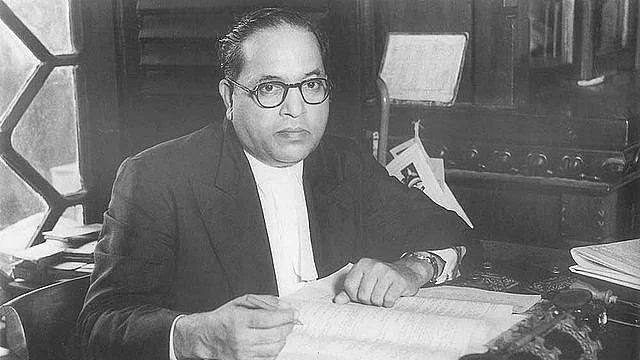Ambedkar’s idea of separate electorate for Dalits
In this excerpt from Ambedkar, Gandhi and Patel – The making of India’s electoral system by Raja Sekhar Vundru, we see Ambedkar struggling to get a separate representative electorate for Dalits

For Ambedkar any electoral system for the dalits, must serve three purposes. First, it must enable the dalits to send its true representatives to the legislatures. Second, dalits must not be completely isolated politically from the majority. Third, it must enable the dalits to influence the election of the members of the majority community to the legislature. Isolation, according to Ambedkar, was the worst thing that would happen to dalits, since no matter how large a representation was given to dalits, it was bound to remain a minority. It was very important for a minority that it should have among the members of the majority community, as many as it could have in the legislature, who would be under the obligation to stand up and support the cause of the dalits.
He felt that the system of unqualified joint electorates served the second purpose but it enabled the majority to influence the election of the representatives of the dalits community, and thus disabled them for defending the interests of their oppression against the ‘tyranny of the majority’. The system, of unqualified separate electorates served the first purpose best but it defeated the second and the third purposes. According to him, the system he proposed served all the three purposes.
Ambedkar wrote to the news agency stating that his one objection to Unqualified Separate Electorates was the existence of the British Imperialism, which, it was alleged, influenced the communities which had separate electorates to act against the interests of the country. With the end of British Imperialism it would be open to the Scheduled Castes to demand qualified separate electorates. The Scheduled Castes were however, prepared to accept the compromise scheme as just adequate for the purpose. But at the same time, Ambedkar adds, that this was the utmost limit of compromise they could go to.
Following this, The National Standard of 3 February 1947 quoted a news item of the Free Press of India with a question mark: Ambedkar-Congress Agreement? It reported: ‘Agreement between the congress and Dr. Ambedkar, President of the All India Scheduled Castes Federation, on the question of representation to the Scheduled Castes in various legislative bodies, is likely to be reached soon, it is learnt here.

It is understood that the ground has already been prepared and letters have been exchanged between Sardar Patel, Home Minister, in the Interim Government and Dr. Ambedkar. The main hitch in it is believed, over the number of seats to be reserved for the Scheduled Castes. However, Congress circles are optimistic regarding an agreement being reached in the Minority Advisory Committee.’
It is stated that the recent speech of Dr. Ambedkar in the Constituent Assembly stressing the need for a strong union, created the necessary atmosphere and paved the way for a compromise on this issue.
Meanwhile in April 1947, the press started reporting the drift between Ambedkar and his close confidants on the issue of Separate Electorates. Quoting the Free Press of India, News Agency, the The Free Press Journal, dated 10 April 1947 reported thus: Ambedkar-Mandal Views Divergent: Tussle over Separate Electorates. The Free Press Journal brought out the divergent views in the Scheduled Caste Federation where Ambedkar was on one side and N. Sivaraj, President of The SCF and J.N. Mandal, towering leader of SCF in Bengal on the other. The issue was the dilution of stand on Separate Electorate by Ambedkar in his attempts to reach a compromise with Congress to ensure the alternative of ‘Qualified Separate Electorate’ which he originally proposed to Gandhi on 23 April 1933.
J.N. Mandal who was very close to Muslim League and later migrated to Pakistan (returned frustrated) disagreed with dilution of the idea of Separate Electorate. J.N. Mandal despite being an SCF member was nominated by the Muslim League under its quota to the Interim Government and Mandal was appointed as the Labour Minister under Nehru’s Interim Government. Bengal was never in the reach of the Congress as the Muslim League swept the polls in 1946.
The combination of dalits and Muslims in Bengal was due to proximity of Mandal with the Muslim League of Bengal. While Ambedkar was busy looking for alternate solutions to the vexed issue of separate electorates, the newspaper reported that Mandal, by then a Minister in the Interim government met the Viceroy and sought to revert to separate electorates. The news report mentioned that N. Sivaraj and J.N. Mandal were in favour of separate electorates and wanted to seek support of the Muslim League. Ambedkar was foresighted enough to have been looking at Congress to arrive at a solution, as he could see the stance of Muslim League towards the idea of Pakistan. Ambedkar’s another treatise, this time on the idea of Pakistan, was already written by him during this period which was published as Partition or Pakistan in 1940 and subsequent editions in 1946 and 1954.
Follow us on: Facebook, Twitter, Google News, Instagram
Join our official telegram channel (@nationalherald) and stay updated with the latest headlines
- Dalits
- Scheduled Castes
- Dr BR Ambedkar
- Ambedkar, Gandhi and Patel
- Raja Sekhar Vundru
- Minority Advisory Committee
